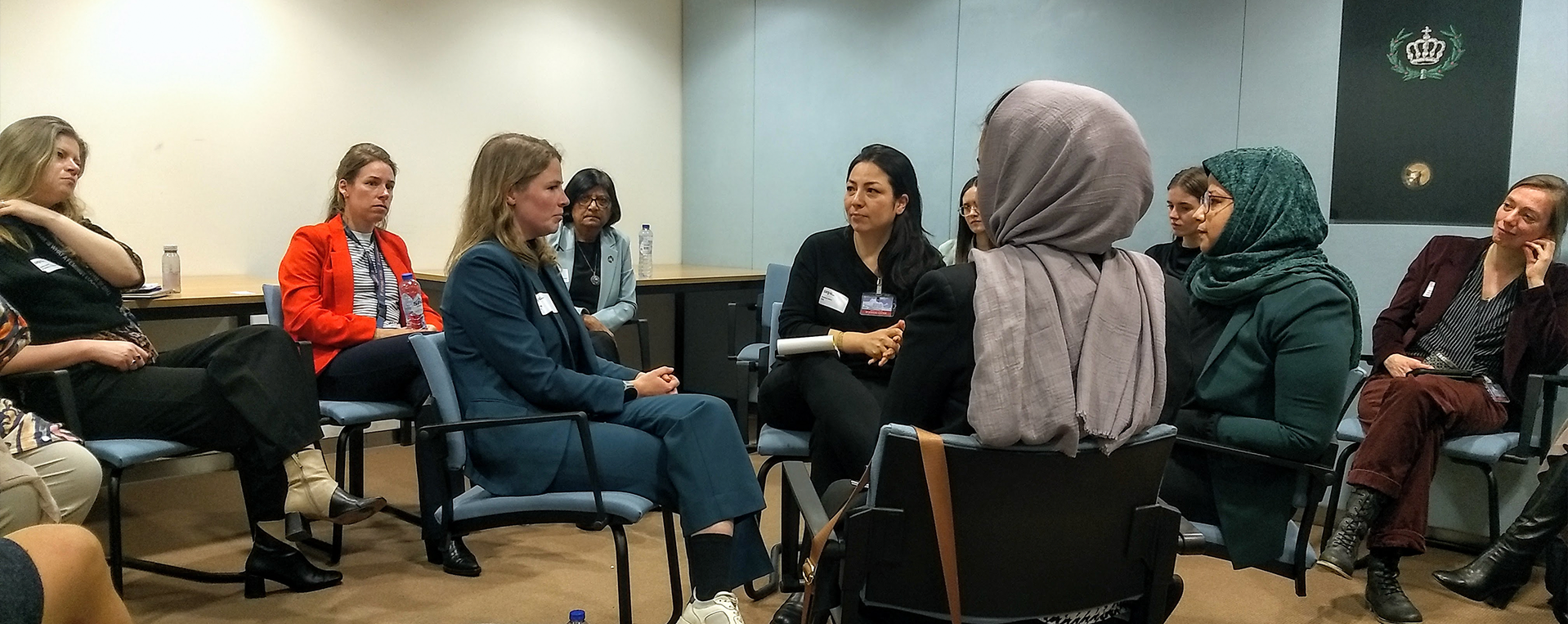On the 7th of March, the signatories of the Dutch National Action Plan 1325 gathered at the Ministry of Defense for an event focused on Women, Men, Peace & Security. During the event, several keynote speakers emphasized the importance of engaging men and masculinities to advance gender equality and foster inclusive peace and security. Following the initial presentations, PAX facilitated a fishbowl discussion on how to develop a Feminist Foreign Policy approach to Civilian Harm Mitigation efforts.
Masculinities and engaging men
In their opening speeches, Minister Ollongren and Colonel Innes Catton emphasized the importance and key strategies for involving men and boys in advancing the Women, Peace & Security-Agenda. Afterwards, an Iraqi women’s rights activist and PAX partner delved into the repercussions of maintaining traditional views on masculinity and femininity, as these traditional views keep fueling militarization and violence and have damaging effects on Iraqi women and girls. Gender in Iraq continues to be constructed as a force of conflict, and she emphasized how men too are victimized through the militarization of masculinities. Recently, political elites have sought to undermine Iraqi women’s rights, thereby shrinking the space of civil society. ‘Not only has gender been attacked,’ she argued, ‘but also human rights, freedom of speech and democracy.’
To address the underlying causes of violence due to gender stereotypes connected top-down and bottom-up approaches are needed. Top-down approach focused on pressuring the Iraqi government to develop and implement policies and laws that protect all individuals from stereotypes and violence. Meanwhile, the bottom-up approach focuses on raising awareness, creating channels of communication and spaces for dialogue, and building bridges between communities, local and national authorities.
Taking a feminist approach to Civilian Harm Mitigation
During the fishbowl discussion facilitated by PAX, the importance of adopting a feminist approach to Civilian Harm Mitigation. Civilian Harm Mitigation extends beyond International Humanitarian Law by embracing civilian-centric viewpoints ahead of and during military operations, considering their societal impact, and implementing measures to reduce civilian harm. It was acknowledged that there is a tension between Feminist Foreign Policy and Civilian Harm Mitigation, as the first advocates for anti-militaristic, preventative, and non-violent approaches, while the latter remains a military-operational concept. Despite this, taking a feminist approach is crucial for advancing a holistic approach that prioritizes both the prevention of violence and the protection of civilian lives and livelihoods. Considering the potential benefits, gender analysis should be incorporated in two areas:
- intelligence-gathering, planning, operations, CIMIC activities
- rights-based considerations in responding to civilian harm.
Whose security?
Through the fishbowl method of facilitation, members of the audience joined the discussion. Iraqi, Afghani and Yemeni activists raised the question: whose security is central? Civilians are affected by different vulnerabilities and threats than armed forces. Therefore, developing policies and practice gender-sensitive and people-centred security allows for a better understanding of the different roles and positions of women, men, girls, and boys in a society. The policy incoherence between Dutch FFP and their position on genocidal violence in Palestine was also passionately questioned. Activists underscored the need of examining the notion of security, as concepts of security are deeply gendered.
Fatema Jafari, an Afghan women’s right activist, stressed the loss of credibility of Women, Peace & Security-initiatives within the country due to their failure to yield tangible results as they lacked a masculinities lens and were insufficiently engaging men in positions of power. She also mentioned the need to reshape the meaning of Feminist Foreign Policy to better address the multifaceted vulnerabilities and threats faced by civilians.
This is an ongoing discussion reflected in PAX’s Feminist Approaches to Foreign Policy, a ten-point PAX manifesto that places civilians, and especially women, at the forefront of security policy.




